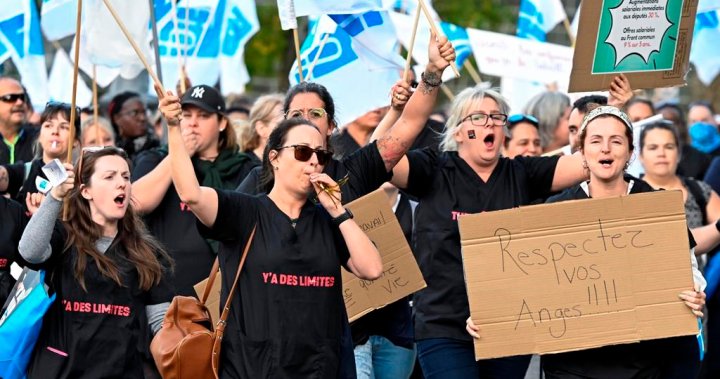Members of the Fédération interprofessionnelle de la santé du Québec (FIQ), a union representing over 80,000 health care workers in Quebec, have rejected a tentative collective agreement with the province that was endorsed by the union’s leadership. The rejection came after 15 months of negotiations and eight days of strikes last fall. Despite the disappointment, FIQ president Julie Bouchard is prepared to return to the negotiating table to advance the interests of union members. The tentative deal included salary increases of at least 17.4% over five years, new premiums for evening, night, and weekend work, greater schedule flexibility for workers, and changes to vacation day accumulation and seniority recognition.
The rejection of the agreement by 61% of members who voted in an online election with a participation rate of 77% has led to uncertainty about the next steps. Bouchard expressed disappointment in the outcome of the vote, emphasizing that the union believed in the agreement they recommended. She plans to regroup with local representatives to understand why the deal was rejected and address any shortcomings. While additional pressure tactics were not ruled out, the focus for now is on negotiations with the provincial government. Quebec Treasury Board President Sonia LeBel indicated that the government would meet with the union to better understand the setback and continue working towards securing more flexibility from FIQ members.
Quebec has already settled several labour disputes with public sector unions in recent months, including a deal approved by education and health care workers with 17.4% pay increases. However, the rejection of the tentative agreement by FIQ members highlights the challenges in reaching consensus during negotiations. The rejection may also lead to further frustration and tension between the union and the provincial government. The union’s decision to reject the deal demonstrates the importance of ensuring that collective agreements address the needs and concerns of all members, and the necessity of open and transparent communication throughout the negotiation process.
Moving forward, both the union and the provincial government will need to work together to find common ground and address the issues that led to the rejection of the tentative agreement. This may involve revisiting certain aspects of the deal, engaging in further discussions, and potentially making concessions to reach a new agreement that is satisfactory to all parties involved. The rejection of the deal serves as a reminder of the complexities and challenges involved in negotiating collective agreements, and the importance of listening to and addressing the concerns of union members throughout the process. It also highlights the need for continued dialogue and collaboration between labour unions and government representatives to ensure fair and equitable agreements that benefit all stakeholders.















